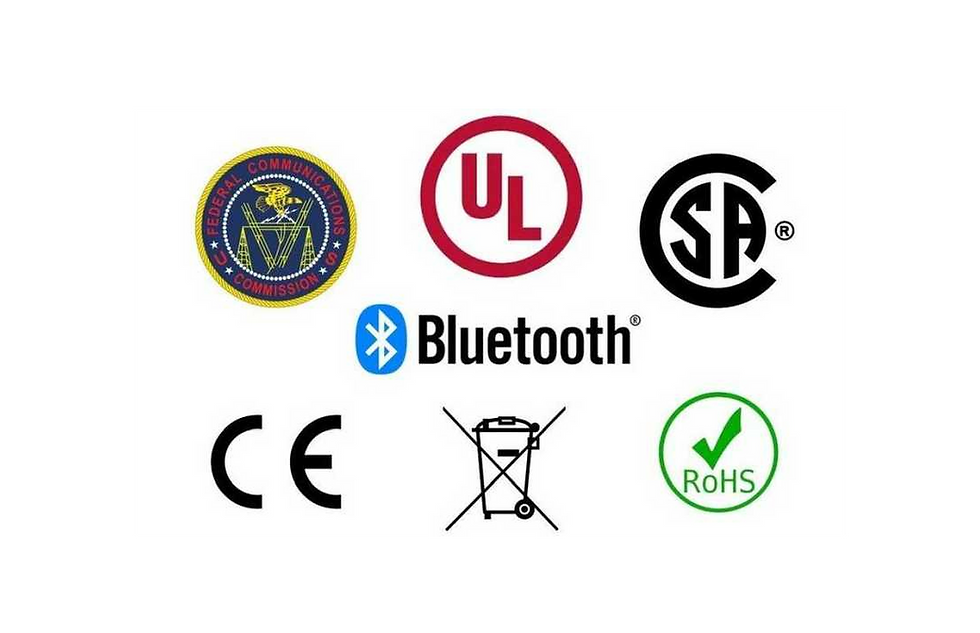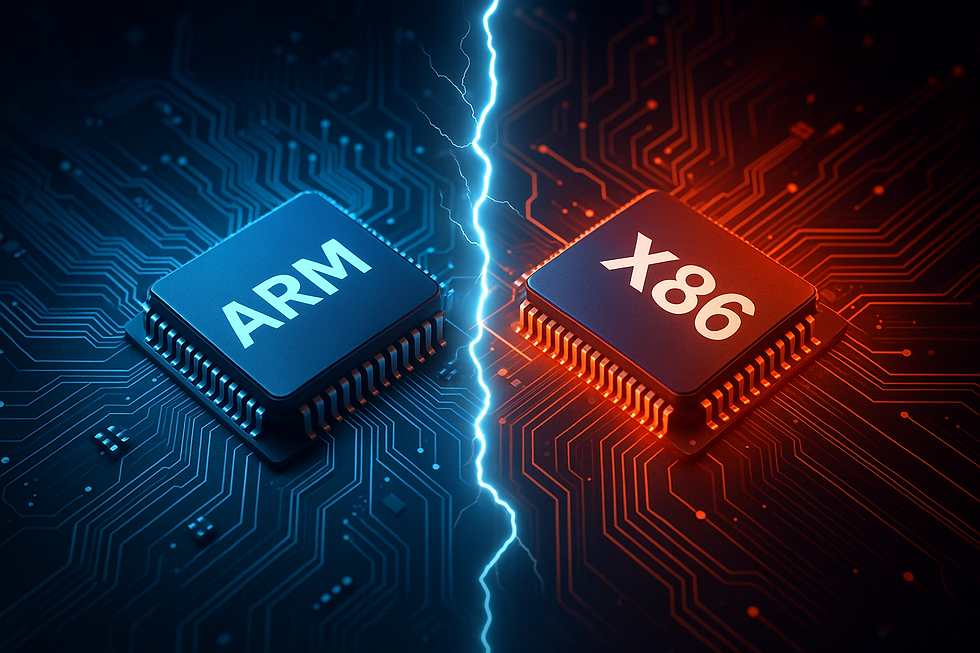Certifications Every Hardware Startup Should Know
- nellalin
- Aug 24, 2025
- 5 min read

Table of Contents
Why Regulatory Certifications Matter
FCC Certification (USA — Radio & Emissions)
CE Marking (EU — European Conformity)
UL/ETL/CSA (Electrical Safety)
RoHS (Restriction of Hazardous Substances)
REACH (Registration, Evaluation, Authorization and Restriction of Chemicals)
Bluetooth SIG and Wi-Fi Alliance Certifications (Wireless Interoperability)
ISO 13485 (Quality Management for Medical Devices)
FDA Approval (US — Medical & Health Devices)
IATF 16949 (Automotive Quality Management)
ISO 26262 (Functional Safety — Road Vehicles)
When to Plan Certifications in the Product Lifecycle
Leveraging Expert Partners for Compliance
Conclusion & Next Steps (How to Ensure Your Product Gets Certified Smoothly)
Certifications Every Hardware Startup Should Know
Launching a hardware product involves more than great design and manufacturing – it also means navigating a maze of hardware product certification requirements. From wireless emissions to electrical safety and environmental regulations, these certifications ensure your device is safe and legally compliant in its target markets. Overlooking compliance can lead to costly redesigns and launch delays, as experienced by many startups that treated regulatory product compliance for startups as an afterthought . In fact, each region (United States, Europe, Asia, etc.) has its own mandatory approvals – FCC approval in the U.S., CE marking in Europe, and so on – and you won’t be allowed to ship or sell your product without them . The good news is that early planning for these certifications can save your startup significant time and money while smoothing the path to market.
Why Regulatory Certifications Matter?
Regulatory certifications are essentially gatekeepers to global markets. They demonstrate that your hardware meets safety, electromagnetic, environmental, and health standards set by governments or industry bodies. For example, FCC and CE approvals certify that a device’s radio-frequency emissions are within legal limits, preventing interference with other electronics . Safety labels like UL reassure that your device won’t electrically shock users or start fires. Environmental compliance like RoHS and REACH show that your product doesn’t contain hazardous substances above permitted levels. Securing these certifications is not just red tape – it’s a critical step to protect users and avoid legal trouble.
Ignoring or delaying compliance has real consequences. Products that fail tests must be redesigned and re-tested, burning through cash and pushing back launch dates . One industry analysis noted that a single month of launch delay can cost a startup tens of thousands in lost revenue, not to mention giving competitors a chance to seize market share . In short, regulatory compliance is not optional: every hardware startup needs to factor it into their development timeline from day one.
FCC Certification (USA – Radio & Emissions)
What it is: Ensures devices meet U.S. radio-frequency emission limits (Part 15 CFR).
Applies to: Virtually all electronics; stricter for wireless transmitters.
Startup tip: Use pre-certified radio modules to simplify approval .
Cost/time impact: Full testing can run thousands of dollars, but module reuse lowers costs.
CE Marking (EU – European Conformity)
What it is: A legal requirement for selling most products in Europe; covers EMC, Radio, Low Voltage, RoHS, and more .
Applies to: Nearly all electronics shipped to EU markets.
Startup tip: Identify relevant directives early; use harmonized standards.
Pitfalls: Products pulled from shelves if later found non-compliant.
UL and Safety Certifications (North America & Global)
What it is: Tests electrical safety (shock, fire, overheating). UL, ETL, CSA marks are recognized.
Legal status: Not federally mandated, but required by retailers/distributors .
Startup tip: Use UL-listed components (power supplies, batteries) to reduce risk.
Global variants: CCC (China), PSE (Japan), Low Voltage Directive (EU).
RoHS (Restriction of Hazardous Substances)
What it is: Limits toxic substances like lead, cadmium, mercury in electronics .
Regions: Required in EU since 2006; adopted globally (e.g. California, China).
Startup tip: Source only RoHS-compliant parts and use lead-free solder from the start .
Ease: Cheaper/easier certification compared to FCC or UL.
REACH (Registration, Evaluation, Authorization and Restriction of Chemicals)
What it is: EU regulation covering thousands of chemicals, requiring transparency and documentation .
Applies to: All industries; electronics included if substances exceed thresholds.
Startup tip: Collect supplier material declarations early; avoid unverified chemicals.
Risk: Fines or import bans for non-compliance .
ISO 13485 (Quality Management for Medical Devices)
What it is: International standard for medical device quality management systems.
Applies to: Any startup making medical or health tech devices.
Startup tip: Implement a QMS early – design files, risk management, supplier oversight.
Global relevance: Required under EU MDR; aligned with FDA expectations.
FDA Approval (US – Medical and Health Devices)
What it is: U.S. medical device regulation by risk class (Class I–III).
Pathways: Many Class II devices require 510(k) clearance; Class III need PMA.
Startup tip: Clarify requirements at the concept stage (Pre-Sub meetings).
Risk: Months-long delays if compliance is overlooked .
IATF 16949 (Automotive Quality Management)
What it is: Global QMS standard for automotive production and service parts, built on ISO 9001.
Pathways: Implement core tools (APQP, PPAP, FMEA, MSA, SPC), meet OEM customer-specific requirements, and certify via an accredited auditor.
Startup tip: Stand up a “QMS-lite” with APQP gates and PPAP-ready docs early; align key suppliers to IATF expectations.
Risk: Disqualified from sourcing, PPAP rejections, and SOP slippage due to quality escapes.
ISO 26262 (Functional Safety — Road Vehicles)
What it is: Functional-safety lifecycle for vehicle E/E systems with ASIL levels (A–D).
Pathways: Run HARA and assign ASIL, create a safety plan and safety case, follow parts 3–7 for development, qualify tools/components (SEooC), and undergo independent assessment.
Startup tip: Appoint a safety manager early, architect to target ASIL, reuse qualified components, and budget for external reviews (e.g., TÜV).
Risk: Late architectural rework, OEM non-acceptance, liability exposure, and 6–18-month delays.
Bluetooth SIG and Wi-Fi Alliance Certifications
Bluetooth: Required to legally market as “Bluetooth.” Registration fee (~$8,000) .
Wi-Fi: Wi-Fi Alliance certification ensures interoperability, trusted by enterprises.
Startup tip: Use pre-certified modules to minimize testing scope and fees.
What to Plan Certifications in the Product Lifecycle?
Design phase: Draft a compliance plan on Day 1 .
Prototype stage: Conduct pre-compliance tests to catch issues early.
Before mass production: Book accredited labs for FCC, CE, safety testing.
Final stage: Mark devices with required logos (FCC ID, CE, recycling) and keep documentation.
Startups that address certification late face “costly redesigns and months of delays” . By contrast, early planning accelerates launch.
Leveraging Expert Partners for Compliance
Working with experienced partners like Rightway can help startups:
Map out required certifications by region.
Review designs for compliance pitfalls.
Connect with suppliers of pre-certified components.
Coordinate lab testing and manage documentation.
Keep up with evolving standards (e.g. IoT cybersecurity requirements).
Outcome: Reduced cost, fewer delays, and higher confidence in scaling globally .
How to Ensure Your Products Get Certified Smoothly?
Hardware certifications – FCC, CE, UL, RoHS, REACH, ISO 13485, FDA, Bluetooth, Wi-Fi – are the non-negotiable gatekeepers to launching your product worldwide. For founders and engineers, the smartest move is to integrate compliance into every development phase.
Rightway helps startups bridge technical innovation with regulatory know-how. By guiding compliance planning, supplier selection, and lab coordination, we help you avoid costly mistakes and launch on time.
👉 If you’re ready to bring your hardware idea to market without compliance roadblocks, contact Rightway today. Together, we’ll ensure your product is not only innovative – but also certified, compliant, and ready for global success.




Comments